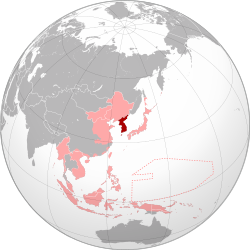Korea under Japanese rule
Korea under Japanese rule is a term to define Korea when it was under Japanese control. Japanese victory in the First Sino-Japanese War in 1895 and in the Russo-Japanese War in 1905 cleared the way. Japan controlled Korea for 35 years during Japanese Imperialism. The Japanese control of Korea lasted from 22 August 1910 until 15 August 1945. The Japanese rulers of Korea left the country on 2 September 1945. In Japan, the more common term is "Korea of the Japanese-Governed Period" (日本統治時代の朝鮮, Nippon Tōchi-jidai no Chōsen).
Korea 朝鮮 Chōsen | |||||||||||||||
|---|---|---|---|---|---|---|---|---|---|---|---|---|---|---|---|
| 1910–1945 | |||||||||||||||
| Anthem: "Kimigayo" | |||||||||||||||
 Map shows Korea (dark red) within the Empire of Japan (light red) at its furthest extent | |||||||||||||||
| Government | Monarchy | ||||||||||||||
• first Emperor | Meiji (1910–1912) | ||||||||||||||
• last Emperor | Shōwa (1926–1945) | ||||||||||||||
| Establishment | |||||||||||||||
• Japanese protectorate | 1905 | ||||||||||||||
• Full Annexation | 1910 | ||||||||||||||
| 1945 | |||||||||||||||
| |||||||||||||||
| Today part of | North Korea, South Korea | ||||||||||||||
The period is usually divided into three parts. In 1910-1919, the Japanese treated Koreans very badly. From 1919 to 1930s they gave Korea some more rights, but still treated them badly. However, they later tried to force them to become Japanese.
Despite them being allies to the United States and having an interest in each other's cultures, Japanese and Koreans still tend to have suspicion of each other because of how Japan treated Korea during its time as a colony
Other websites
change- Isabella Lucy Bird (1898), Korea and Her Neighbours: A Narrative of Travel, with an Account of the Recent Vicissitudes and Present Position of the Country
- Horace Newton Allen (1908), Things Korean: A Collection of Sketches and Anecdotes, Missionary and Diplomatic
- Hildi Kang (2001), Under the Black Umbrella: Voices from Colonial Korea, 1910-1945, Cornell University Press, ISBN 0-8014-7270-9
- Toshiyuki Mizoguchi, "Consumer Prices and Real Wages in Taiwan and Korea under Japanese Rule" Hitotsubashi Journal of Economics, 13(1): 40-56
- Toshiyuki Mizoguchi, "Economic Growth of Korea under the Japanese Occupation - Background of Industrialization of Korea 1911-1940" Hitotsubashi Journal of Economics, 20(1): 1-19
- Toshiyuki Mizoguchi, "Foreign Trade in Taiwan and Korea under Japanese Rule" Hitotsubashi Journal of Economics, 14(2): 37-53
- Kim, Young-Koo, The Validity of Some Coerced Treaties in the Early 20th Century: A Reconsideration of the Japanese Annexation of Korea in Legal Perspective[permanent dead link]

